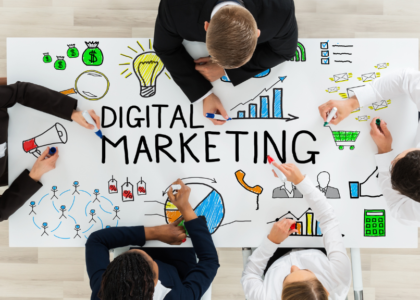In today’s fast-paced online world, small businesses face tough competition. Bigger companies often have larger budgets. Without a strong digital marketing plan, small businesses can get lost. The good news? Affordable and effective digital marketing strategies can help them compete and succeed online.
However, there’s good news. Despite having fewer resources, small businesses can still level the playing field. By adopting smart, cost-effective, and results-driven digital marketing strategies, they can carve out their own space online. These strategies can help small businesses boost their visibility, attract more customers, and even compete directly with larger companies.
At Accentor Solutions, we understand the unique challenges faced by small businesses and are committed to providing actionable strategies that work. Whether you’re just getting started or looking to refine your current approach, this guide will help you make the most of your digital marketing efforts.
Table of Contents
ToggleWhat is Digital Marketing?

Digital Marketing uses channels like websites, social media, and search engines to promote products or services. It includes various tactics such as SEO, content marketing, and paid ads. Moreover, businesses can reach customers more effectively with these tools. In addition, digital marketing provides a measurable way to grow your audience. Overall, it is one of the most flexible forms of marketing available.
Digital Marketing for Small Businesses
Small businesses benefit greatly from digital marketing strategies. For instance, it helps them compete with larger firms by reaching a specific audience. Additionally, businesses can increase brand awareness while generating leads. Moreover, digital marketing boosts customer engagement and loyalty. To see how your business can thrive, explore Accentor Solutions’ digital marketing services.
Importance of Target Audience in Digital Marketing

Defining Your Audience
Knowing your audience is a critical first step in any digital marketing plan. Therefore, you need to understand who is most likely to purchase your product or service. Defining this group helps create focused marketing campaigns. You can tailor your content to meet their specific needs. This makes your marketing efforts more efficient and cost-effective.
Researching Audience Preferences
Tools like Google Analytics can reveal important details about your audience. Additionally, these insights show what your potential customers are interested in. You can also use social media analytics to gain a deeper understanding. Once you gather this data, you can customize your marketing messages. This alignment helps ensure you’re addressing your customers’ preferences effectively.
Building a Strong Online Presence with Digital Marketing

The Role of a Website in Digital Marketing
Your website is your business’s digital headquarters. Therefore, it must be user-friendly, fast, and optimized for mobile devices. In fact, customers often judge your business based on their experience with your website. As a result, a poor website design can drive visitors away.
The Use of SEO in Digital Marketing
SEO is vital in helping your website appear in search engine results. It involves optimizing your content so search engines like Google can find you easily. A strong SEO strategy boosts your website’s visibility, making it easier for customers to find you. SEO includes both technical aspects and content quality.
Social Media’s Role in Digital Marketing
Social media is a crucial component of any digital marketing plan. For example, platforms like Facebook and Instagram allow businesses to engage directly with their audience. By posting relevant content, you can build stronger relationships with your customers. Paid social media ads also help reach a broader audience. Engaging on social media helps foster brand loyalty and trust.
Content Marketing as a Digital Marketing Strategy

Planning a Content Calendar
Consistency is key when it comes to content marketing. Moreover, a content calendar helps you stay on track with your posts, videos, and other media. This ensures your audience always has fresh material with which to engage. Planning also allows you to align content with your business goals. Timely and relevant content keeps your audience interested and coming back for more.
Types of Content
Various types of content serve different purposes. Blog posts, videos, and infographics each offer unique benefits. For example, blogs can help improve SEO, while videos tend to increase engagement. Infographics are easily shareable and can spread your brand message quickly.
| Content Type | Purpose | Benefit |
|---|---|---|
| Blog Posts | Informative, educational, and SEO-friendly content. | Helps drive organic traffic to your website and establishes your business as an industry authority. |
| Videos | Engaging visual content that can explain, demonstrate, or entertain. | Increases audience engagement and is more likely to be shared, boosting visibility. |
| Infographics | Visual content that simplifies complex information. | Easy to digest, highly shareable, and great for explaining data or processes. |
| Social Media Posts | Short, engaging updates shared on platforms like Facebook, Instagram, and Twitter. | Helps increase brand visibility, engage with followers, and drive traffic to your website. |
| Email Newsletters | Direct communication with your audience through personalized email campaigns. | Builds relationships, nurtures leads, and promotes new products, services, or content. |
| Podcasts | Audio content that discusses relevant industry topics or interviews experts. | Expands your reach and offers content in a convenient, consumable format. |
| eBooks/Whitepapers | In-depth, downloadable content that offers value on a specific topic. | Helps generate leads and builds authority by providing valuable insights to your audience. |
| Case Studies | Real-world examples of how your product or service has benefited customers. | Builds trust by showcasing proven success and demonstrating value to potential customers. |
| Webinars | Live or recorded video presentations on industry-related topics. | Engages your audience, offers valuable information, and positions you as a thought leader. |
| Interactive Content (Quizzes, Polls, Surveys) | Content that encourages audience participation. | Boosts engagement and provides valuable insights into customer preferences and behavior. |
Email Marketing as a Part of Your Digital Marketing Strategy

The Power of Email Marketing
Email marketing is one of the most effective ways to reach customers. Even though social media is popular, emails offer a more personalized approach. Businesses can tailor messages specifically to their subscribers. These personalized emails often lead to higher engagement and conversions. Email marketing is also cost-effective, making it perfect for small businesses.
Email Marketing Tools for Small Businesses
There are many tools available to help automate email marketing campaigns. For instance, platforms like Mailchimp and ActiveCampaign offer easy-to-use features. These tools let you send targeted messages to the right people at the right time. Automation saves you time and increases engagement. Email marketing software also provides detailed analytics, helping you refine your strategy.
Pay-Per-Click Advertising (PPC) in Digital Marketing
How PPC Ads Boost Your Digital Marketing Strategy
PPC advertising allows businesses to reach specific audiences through paid ads. Furthermore, you only pay when someone clicks on your ad, making it a cost-effective option. PPC ads can appear on search engines or social media platforms. As a result, this method provides immediate results and drives traffic to your website. Overall, it’s an excellent way to supplement your organic marketing efforts.
Social Media Marketing for Small Businesses

Social Media’s Importance in a Digital Marketing Strategy
Social media is a key player in any modern digital marketing strategy. Moreover, it offers businesses a direct line of communication with their audience. Posts, stories, and ads on platforms like Instagram and LinkedIn help build brand awareness. In addition, social media fosters customer engagement, encouraging followers to interact with your business. Small businesses can use social media to grow their presence and increase sales.
The Use Of Marketing Automation Tools
Marketing Automation Tools and their usage
| Tool Name | Key Features | Best For |
|---|---|---|
| HubSpot | Email marketing, CRM, lead management, analytics | Inbound marketing strategies |
| Mailchimp | Email campaigns, audience segmentation, templates | Small to medium-sized businesses |
| ActiveCampaign | Email marketing, CRM, automation workflows | Customer relationship management |
| Marketo | Advanced analytics, lead scoring, engagement tools | Larger enterprises with complex needs |
| Hootsuite | Social media scheduling, monitoring, analytics | Social media marketing |
How Automation Enhances Your Online Presence
Marketing automation tools streamline repetitive tasks like email campaigns. They ensure customers receive timely and relevant messages without manual effort. Automation platforms handle social media scheduling, email follow-ups, and more. This saves time and helps maintain consistent communication with your audience.
Influencer Marketing in Digital Marketing Strategies

Using Influencer Marketing in Digital Marketing
Influencer marketing can improve your digital marketing plan. By partnering with influencers, you can reach their audience and increase brand awareness. Influencers build trust with their followers, which helps your business. Additionally, working with influencers allows small businesses to find new customers quickly. This approach works well for launching products or promoting services.
Local SEO in Digital Marketing for Small Businesses

Why Local SEO is Vital for Small Businesses
Local SEO is essential for businesses that rely on nearby customers. Optimizing your website for local search results helps people in your area find you. Local SEO involves strategies like using Google My Business and local keywords. These tactics improve your online visibility within your community. For more strategies, check out Accentor Solutions’ guide on business process outsourcing (BPO).
Comparison of Digital Marketing Strategies
| Strategy | Benefits | Challenges | Best For |
|---|---|---|---|
| SEO | Improves long-term visibility | Time-consuming and requires expertise | Building organic traffic |
| Social Media Marketing | Enhances brand engagement and awareness | Requires continuous content creation | Reaching a wide audience |
| Email Marketing | Personalized and targeted communication | Can be seen as spam if overused | Nurturing leads and repeat customers |
| PPC Advertising | Immediate visibility and traffic boost | Can be expensive depending on keywords | Driving quick traffic to the website |
| Content Marketing | Builds trust and authority in the niche | Takes time to see results | Educating and engaging potential customers |
Analyzing the Success of Your Digital Marketing Campaigns

Using Analytics to Improve Your Digital Marketing Strategy
Tracking the results of your digital marketing efforts is important. For example, tools like Google Analytics help you track traffic, conversions, and how users behave on your site. These numbers show if your campaigns are working. If not, you can make changes based on the data. Overall, analyzing your results helps you keep improving your digital marketing strategy.
Digital MARKETING COMPAIGNS SUCCESS ANALYSES TOOLS
| Tool | What it Does | Why Use it |
|---|---|---|
| Google Analytics | Tracks website traffic, user behavior, and conversion rates. | Provides detailed insights into how visitors interact with your website and helps optimize digital marketing strategies. |
| Google Ads | Measures the performance of your Pay-Per-Click (PPC) campaigns. | Allows you to track click-through rates, conversions, and ROI of your ads. |
| HubSpot | Provides an all-in-one marketing platform to track SEO, email campaigns, social media, and more. | Integrates all aspects of your marketing strategy and provides actionable insights for improvement. |
| SEMrush | Tracks SEO performance, keyword rankings, and competitor analysis. | Helps improve your website’s SEO and monitor the success of your SEO efforts. |
| Hootsuite | Manages and tracks social media campaigns across multiple platforms. | Allows you to schedule posts and monitor engagement, follower growth, and overall performance on social media. |
The Future of Digital Marketing for Small Businesses
In today’s digital-first world, small businesses must use effective digital marketing strategies to succeed. Digital marketing is no longer just an option; in fact, it’s a must. It allows businesses to reach a larger audience, increase visibility, and gain leads. Whether it’s through SEO, email marketing, social media, or paid ads, a good digital marketing plan can make your brand more visible and help you achieve your business goals. Even better, the right strategies can help small businesses compete with bigger companies. By investing time and resources into digital marketing today, you’ll see long-term growth for your business.
Frequently Asked Questions
What are the most effective digital marketing strategies for small businesses?
Effective strategies include content marketing, social media marketing, search engine optimization (SEO), email marketing, and pay-per-click (PPC) advertising. Each strategy can help increase visibility and engagement with potential customers. For professional guidance and customized solutions, Accentor Solutions offers expert services in these key areas of digital marketing.
How can small businesses utilize social media for marketing?
Small businesses can leverage social media by creating engaging content, interacting with followers, running targeted ad campaigns, and collaborating with influencers to reach a broader audience. Accentor Solutions helps businesses maximize their social media impact with tailored strategies for building online communities and driving engagement.
Why is SEO important for small businesses?
SEO helps small businesses improve their online visibility in search engine results. By optimizing their website and content for relevant keywords, they can attract organic traffic and potential customers actively searching for their products or services. Accentor Solutions specializes in SEO services that ensure higher search rankings and increased visibility.
How can email marketing benefit small businesses?
Email marketing allows small businesses to directly communicate with their audience, share promotions, and provide valuable content. It helps build customer relationships and can drive repeat business when done effectively. Accentor Solutions offers effective email marketing services that can enhance customer engagement and retention.
What budget considerations should small businesses keep in mind for digital marketing?
Small businesses should start with a clear budget that allocates funds to various digital marketing strategies. It’s essential to track the return on investment (ROI) for each strategy to adjust spending based on what works best for their specific goals. Accentor Solutions can help small businesses create cost-effective digital marketing strategies that provide measurable ROI.












